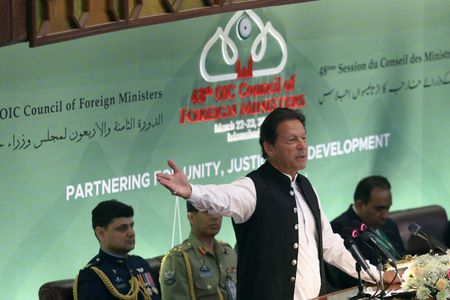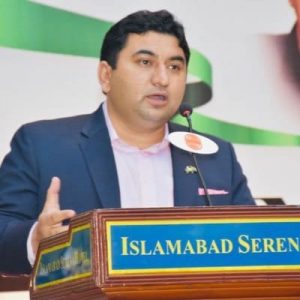
How did Imran Khan Replace Pakistani Islamists?

From Naya Pakistan to Riasat e Madina, Imran Khan has silently transformed his political rhetoric. Imran Khan was categorized as a Muslim democrat, but he turned out to be an Islamist and even started being a religious preacher in political campaigns and rallies. This shift is appreciated among the public, as a large section of Pakistani society, want popular leaders to be religiously conservative.
People wanted to see a leader with western exposure to be religious and who can compare East and West. Imran Khan understood this soft belly of public sentiments. The already established Islamic parties failed to translate their right-wing religious base into a strong electoral power to change Pakistan’s constitution, so that they could bring in Islamic sharia. This was when Islamists and political Islam were defensive, facing transformation and re-inventing their role after 9/11.
Before the 2018 elections, Imran Khan continuously kept targeting right-wing Islamic parties for using religion and termed them as “Traders of Religion”. Imran Khan’s first impression as a Western-educated, cricket legend and philanthropist was sufficient to make inroads in liberal and conservative segments of society that wanted a replacement for the Pakistan People’s Party and Pakistan Muslim League (Nawaz). He was a good choice for the Pakistani diaspora abroad, who are normally religiously conservative and struggle to keep their Pakistani identity in the Western world.
Initially, PTI was a progressive center-right party that was attracted by a right-wing constituency of Islamists in Khyber Pakhtunkhwa. PTI dominated the socio-political and religious narrative of other Islamist parties through social media, which other parties and particularly Islamists were not mastering. Music, dance, motivational political songs, and recitation of the Holy Quran and sayings of the Holy Prophet remained part of his political discourse before 2018, but at a slow pace. Largely PTI was known as anti-status quo, a party that dominates the agenda of accountability of other parties who ruled the country.
What forced Imran Khan to bring religion into his political discourse, while he grabbed power as a charismatic cricket celebrity? He was voted in power in Khyber Pakhtunkhwa where normally Pashtun nationalist and confessional parties like Jamat I Islami and Jamiat Ulma e Islam (F) grabbed power. So, knowing that KPK is a religiously conservative province, he started using religion as a tool.
In the previous two elections, he rooted out Islamist parties from KPK, which used to be their political base. Imran’s Western credentials meant that he knew their system and by becoming a practicing non-corrupt Muslim, he gave confidence to the people that he is the right person, who while embracing Islam, understands the West too. Confessional parties failed to bring Islamic sharia, as their political spectrum was limited. But PTI grabbed liberals, conservatives, nationalists, and Islamists.
After becoming the Prime Minister, Imran Khan realized that his campaign slogans regarding accountability, good governance, electoral reforms, political and economic decentralization had failed to attract the masses. He used religious preaching in political rallies and media exchange to attract the masses and started diverting the attention of people by initiatives like establishing the Rehmatul- Lil Almeen Authority to make Pakistanis aware of the life of Prophet Muhammad (PBUH). He believed that this will be appreciated by the right religious constituency in the country, educated liberal class, business class, and voters of Tehreek e Labaik (TLP). He believed that the TLP had emerged as an influential right-wing Islamic party in Punjab and therefore, attracting its voters will be easy by such measures.
Imran Khan took credit for starting a debate in OIC and designating a special day on 15th March at UN General Assembly on combating Islamophobia. He lamented Pakistan’s confessional parties for their failures to take issues of Muslims of Pakistan at global platforms and this raised his credibility among sympathizers and supporters of his followers and Islamist parties. His orientation towards the religious right is a structural compulsion that lies in the socio-religious fabric of the Pakistani society in general, and particularly in KPK which is his home constituency.
Opposition parties have submitted a no-confidence motion against his party in parliament, as more than two dozen parliamentarians are ready to leave him. Since Imran Khan believes he may lose power in the next few days, he has called upon his workers, supporters, and followers to attend a big political rally, and the name of that rally is ‘Amar Bil Maruf’ (encourage people to do good).
Such slogans used to be part of the political discourse of Islamists, but since Imran Khan is losing popularity, he is using religious sloganeering for his political survival. Meanwhile, the OIC Foreign Ministers conference in Islamabad and the songs that have been released for the OIC conference had religious-nationalist sloganeering.
PTI is working to construct Imran Khan’s image as a leader of Muslim Ummah among Pakistanis for his bold speech, where he targeted OIC and global leadership for miseries of Kashmiris and Palestinians. His massive religious orientation disturbs Islamic parties as they lack charismatic leadership, undented past, and do not have a drive of accountability against other politicians. Traditional Islamists may not be as important as an Islamic electoral group in the coming elections, as Imran Khan does all that Islamists used to do.
**************
Disclaimer
The opinions expressed in this article are the author’s own and do not reflect the views of Chanakya Forum. All information provided in this article including timeliness, completeness, accuracy, suitability or validity of information referenced therein, is the sole responsibility of the author. www.chanakyaforum.com does not assume any responsibility for the same.
Chanakya Forum is now on . Click here to join our channel (@ChanakyaForum) and stay updated with the latest headlines and articles.
Important
We work round the clock to bring you the finest articles and updates from around the world. There is a team that works tirelessly to ensure that you have a seamless reading experience. But all this costs money. Please support us so that we keep doing what we do best. Happy Reading
Support Us





















POST COMMENTS (1)
Kalidan Singh